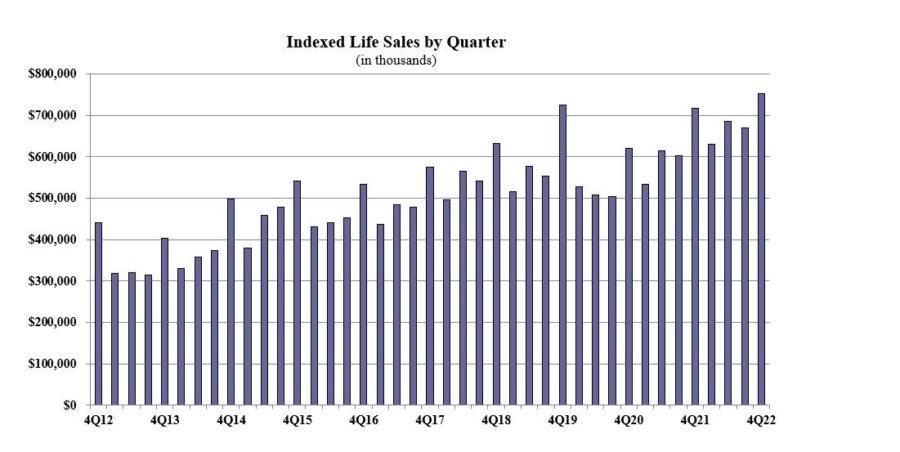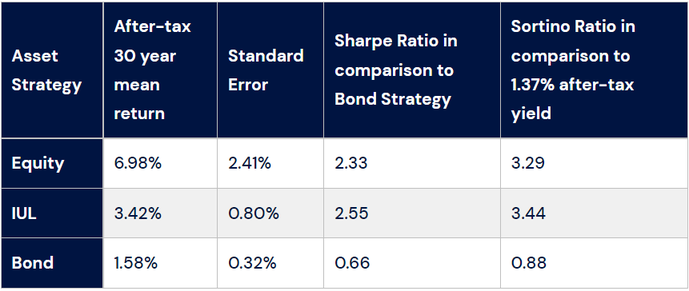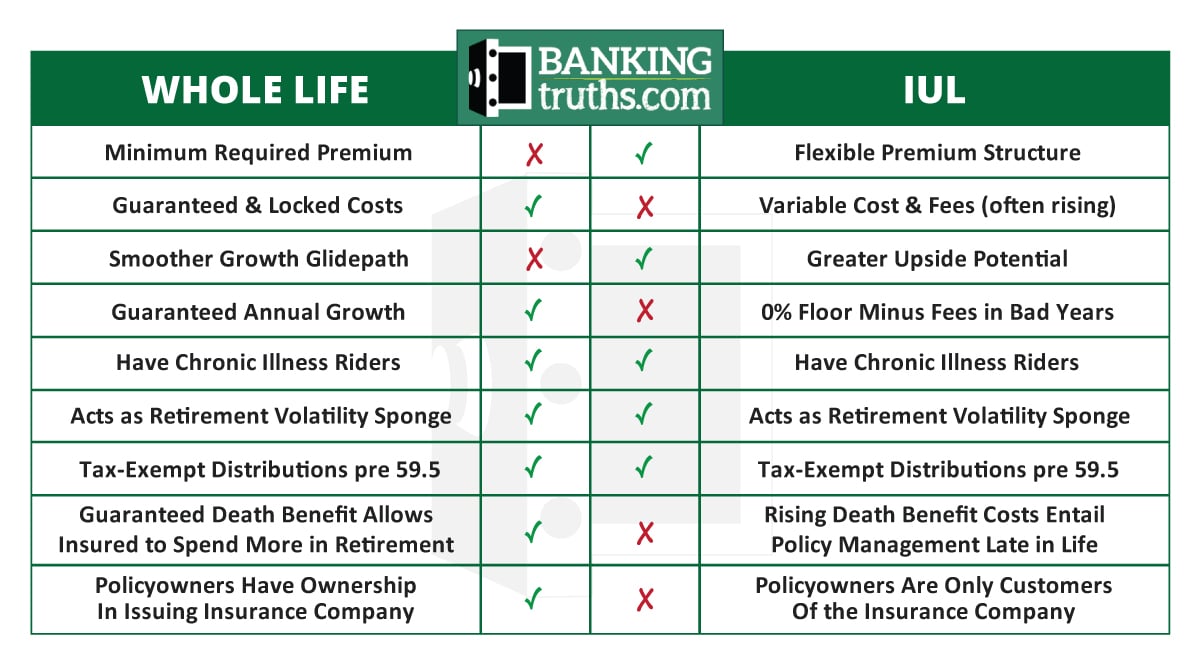All Categories
Featured
Table of Contents
Do they contrast the IUL to something like the Lead Total Stock Market Fund Admiral Shares with no load, a cost ratio (EMERGENCY ROOM) of 5 basis points, a turn over proportion of 4.3%, and an outstanding tax-efficient document of distributions? No, they contrast it to some terrible actively handled fund with an 8% lots, a 2% ER, an 80% turn over proportion, and a horrible document of temporary capital gain circulations.
Shared funds usually make yearly taxed distributions to fund proprietors, also when the value of their fund has actually gone down in value. Common funds not just need revenue reporting (and the resulting annual taxes) when the shared fund is increasing in value, however can additionally enforce income tax obligations in a year when the fund has actually decreased in worth.
You can tax-manage the fund, harvesting losses and gains in order to minimize taxable distributions to the investors, but that isn't somehow going to transform the reported return of the fund. The possession of mutual funds might need the common fund owner to pay projected taxes (which is better whole life or universal life).

IULs are simple to position to ensure that, at the proprietor's fatality, the recipient is exempt to either earnings or estate tax obligations. The exact same tax obligation reduction techniques do not work nearly as well with common funds. There are many, typically pricey, tax obligation traps related to the timed acquiring and marketing of mutual fund shares, traps that do not relate to indexed life insurance policy.
Chances aren't really high that you're going to go through the AMT as a result of your common fund circulations if you aren't without them. The rest of this one is half-truths at best. As an example, while it holds true that there is no income tax because of your heirs when they inherit the profits of your IUL policy, it is likewise true that there is no revenue tax because of your beneficiaries when they inherit a common fund in a taxable account from you.
Indexed Variable Universal Life Insurance
There are better means to stay clear of estate tax problems than buying investments with reduced returns. Mutual funds may create income taxes of Social Protection advantages.

The growth within the IUL is tax-deferred and may be taken as tax obligation complimentary revenue through fundings. The plan proprietor (vs. the mutual fund supervisor) is in control of his or her reportable revenue, therefore allowing them to lower or perhaps get rid of the taxes of their Social Protection advantages. This is wonderful.
Here's another marginal issue. It's true if you get a common fund for say $10 per share simply prior to the circulation date, and it distributes a $0.50 circulation, you are after that mosting likely to owe taxes (most likely 7-10 cents per share) although that you haven't yet had any kind of gains.
In the end, it's truly regarding the after-tax return, not how much you pay in taxes. You're also most likely going to have even more cash after paying those tax obligations. The record-keeping requirements for having shared funds are significantly a lot more complex.
With an IUL, one's records are maintained by the insurance business, copies of yearly declarations are sent by mail to the proprietor, and distributions (if any type of) are completed and reported at year end. This set is additionally kind of silly. Certainly you must maintain your tax records in case of an audit.
Buy Iul
All you need to do is shove the paper right into your tax obligation folder when it turns up in the mail. Rarely a reason to purchase life insurance policy. It's like this individual has never invested in a taxable account or something. Common funds are generally part of a decedent's probated estate.
In addition, they undergo the delays and expenses of probate. The earnings of the IUL policy, on the various other hand, is always a non-probate distribution that passes beyond probate straight to one's named beneficiaries, and is therefore not subject to one's posthumous lenders, unwanted public disclosure, or comparable delays and costs.
We covered this set under # 7, however simply to summarize, if you have a taxed common fund account, you have to put it in a revocable trust (or also simpler, utilize the Transfer on Fatality classification) to avoid probate. Medicaid disqualification and lifetime revenue. An IUL can offer their owners with a stream of revenue for their whole lifetime, no matter how much time they live.

This is beneficial when arranging one's affairs, and converting assets to revenue before a nursing home confinement. Shared funds can not be converted in a comparable fashion, and are generally thought about countable Medicaid assets. This is an additional stupid one advocating that inadequate individuals (you understand, the ones who need Medicaid, a government program for the bad, to pay for their nursing home) should utilize IUL as opposed to common funds.
New York Life Iul
And life insurance policy looks terrible when compared fairly against a pension. Second, people who have money to buy IUL over and past their retired life accounts are mosting likely to have to be horrible at handling cash in order to ever certify for Medicaid to spend for their nursing home prices.
Chronic and terminal disease cyclist. All policies will certainly permit a proprietor's easy accessibility to cash from their plan, usually forgoing any kind of abandonment penalties when such individuals suffer a significant disease, require at-home treatment, or come to be confined to a nursing home. Common funds do not provide a similar waiver when contingent deferred sales fees still use to a shared fund account whose owner requires to offer some shares to fund the prices of such a remain.
Pacific Life Indexed Universal Life
Yet you reach pay more for that advantage (cyclist) with an insurance coverage policy. What a lot! Indexed universal life insurance policy offers survivor benefit to the recipients of the IUL owners, and neither the proprietor nor the beneficiary can ever lose cash due to a down market. Mutual funds supply no such warranties or survivor benefit of any kind of kind.
I certainly don't require one after I reach monetary self-reliance. Do I want one? On average, a purchaser of life insurance coverage pays for the real expense of the life insurance benefit, plus the prices of the plan, plus the revenues of the insurance coverage company.
Equity Index Insurance
I'm not entirely certain why Mr. Morais included the entire "you can not shed money" once again below as it was covered rather well in # 1. He just wanted to repeat the most effective selling point for these things I intend. Once more, you don't lose nominal bucks, but you can shed genuine dollars, along with face major opportunity expense because of reduced returns.

An indexed universal life insurance coverage plan proprietor may trade their policy for a totally different plan without causing earnings tax obligations. A shared fund owner can stagnate funds from one common fund firm to an additional without marketing his shares at the previous (hence activating a taxed event), and buying new shares at the latter, commonly based on sales fees at both.
While it is real that you can trade one insurance plan for another, the reason that people do this is that the initial one is such a horrible plan that also after acquiring a new one and experiencing the very early, adverse return years, you'll still come out ahead. If they were marketed the best policy the very first time, they should not have any type of desire to ever before trade it and experience the early, negative return years once more.
Latest Posts
Iul Insurance Meaning
Iul Life Insurance Calculator
Universal Life Calculator